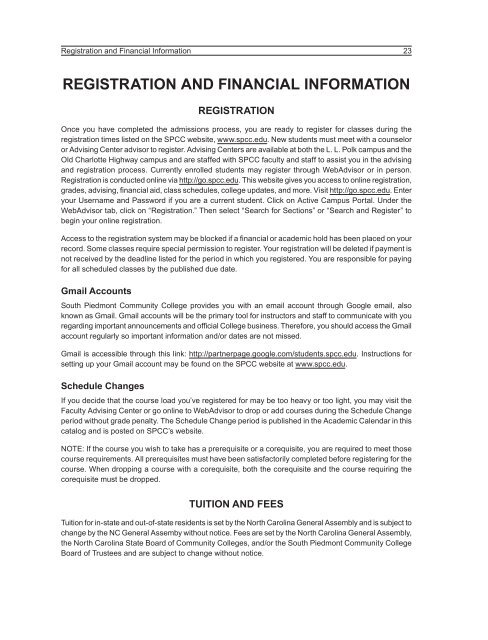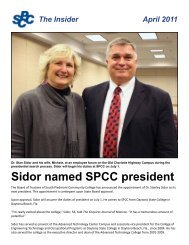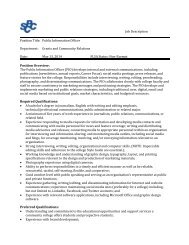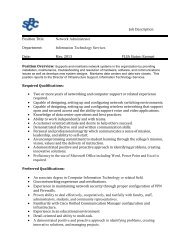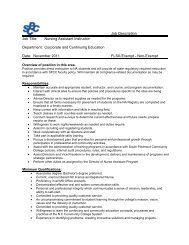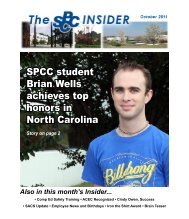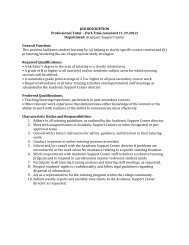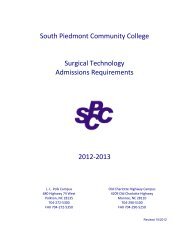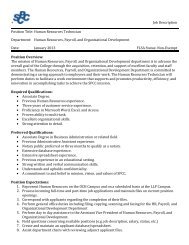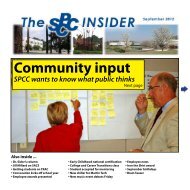Registration and Financial Information - South Piedmont Community ...
Registration and Financial Information - South Piedmont Community ...
Registration and Financial Information - South Piedmont Community ...
You also want an ePaper? Increase the reach of your titles
YUMPU automatically turns print PDFs into web optimized ePapers that Google loves.
<strong>Registration</strong> <strong>and</strong> <strong>Financial</strong> <strong>Information</strong> 23REGISTRATION AND FINANCIAL INFORMATIONREGISTRATIONOnce you have completed the admissions process, you are ready to register for classes during theregistration times listed on the SPCC website, www.spcc.edu. New students must meet with a counseloror Advising Center advisor to register. Advising Centers are available at both the L. L. Polk campus <strong>and</strong> theOld Charlotte Highway campus <strong>and</strong> are staffed with SPCC faculty <strong>and</strong> staff to assist you in the advising<strong>and</strong> registration process. Currently enrolled students may register through WebAdvisor or in person.<strong>Registration</strong> is conducted online via http://go.spcc.edu. This website gives you access to online registration,grades, advising, financial aid, class schedules, college updates, <strong>and</strong> more. Visit http://go.spcc.edu. Enteryour Username <strong>and</strong> Password if you are a current student. Click on Active Campus Portal. Under theWebAdvisor tab, click on “<strong>Registration</strong>.” Then select “Search for Sections” or “Search <strong>and</strong> Register” tobegin your online registration.Access to the registration system may be blocked if a financial or academic hold has been placed on yourrecord. Some classes require special permission to register. Your registration will be deleted if payment isnot received by the deadline listed for the period in which you registered. You are responsible for payingfor all scheduled classes by the published due date.Gmail Accounts<strong>South</strong> <strong>Piedmont</strong> <strong>Community</strong> College provides you with an email account through Google email, alsoknown as Gmail. Gmail accounts will be the primary tool for instructors <strong>and</strong> staff to communicate with youregarding important announcements <strong>and</strong> official College business. Therefore, you should access the Gmailaccount regularly so important information <strong>and</strong>/or dates are not missed.Gmail is accessible through this link: http://partnerpage.google.com/students.spcc.edu. Instructions forsetting up your Gmail account may be found on the SPCC website at www.spcc.edu.Schedule ChangesIf you decide that the course load you’ve registered for may be too heavy or too light, you may visit theFaculty Advising Center or go online to WebAdvisor to drop or add courses during the Schedule Changeperiod without grade penalty. The Schedule Change period is published in the Academic Calendar in thiscatalog <strong>and</strong> is posted on SPCC’s website.NOTE: If the course you wish to take has a prerequisite or a corequisite, you are required to meet thosecourse requirements. All prerequisites must have been satisfactorily completed before registering for thecourse. When dropping a course with a corequisite, both the corequisite <strong>and</strong> the course requiring thecorequisite must be dropped.TUITION AND FEESTuition for in-state <strong>and</strong> out-of-state residents is set by the North Carolina General Assembly <strong>and</strong> is subject tochange by the NC General Assemby without notice. Fees are set by the North Carolina General Assembly,the North Carolina State Board of <strong>Community</strong> Colleges, <strong>and</strong>/or the <strong>South</strong> <strong>Piedmont</strong> <strong>Community</strong> CollegeBoard of Trustees <strong>and</strong> are subject to change without notice.
24 <strong>Registration</strong> <strong>and</strong> <strong>Financial</strong> <strong>Information</strong>Residency Classification for Tuition PurposesTo qualify as an in-state resident for tuition purposes, you must be a U. S. citizen <strong>and</strong> have establishedlegal residence in North Carolina for a period of at least twelve (12) months prior to your enrollment at<strong>South</strong> <strong>Piedmont</strong> <strong>Community</strong> College. Proof of residency can be determined by (but not limited to) thefollowing criteria:••North Carolina driver’s license••North Carolina State Income Tax Return••Proof of acquired property in NC (no rent or lease agreements will be accepted)••Listed personal property for taxation purposesOnce you provide satisfactory information to the SPCC Admissions Office, in-state tuition rates will beapplied. Failure to provide the requested information will result in being classified as an out-of-stateresident, <strong>and</strong> you will be charged out-of-state tuition rates.In-State TuitionIn-state tuition is $56.50 per semester hour of credit plus fees up to 16 semester credit hours. Studentstaking 16 or more semester credit hours:Out-of-State TuitionTuition (maximum) $904.00Technology Fee (maximum) 16.00Activity Fee (maximum) 32.00Accident Insurance 1.20Academic Support Fee (Tutoring) 5.00Career Assessment Fee 5.00Learning College Portfolio Fee 10.00Total $973.20Out-of-state tuition applies to any student whose legal residence is outside of North Carolina (see ResidencyClassification for Tuition Purposes). Out-of-state tuition is $248.50 per semester hour of credit plus fees upto 16 semester credit hours. Students taking 16 or more semester credit hours:Technology FeeTuition (maximum) $3,976.00Technology Fee (maximum) 16.00Activity Fee (maximum) 32.00Accident Insurance 1.20Academic Support Fee (Tutoring) 5.00Career Assessment Fee 5.00Learning College Portfolio Fee 10.00Total $4,045.20The Technology Fee is $1 per semester hour up to a maximum of $16 for 16 or more semester hours.This fee is used to support the procurement, operations, <strong>and</strong> repair of computers <strong>and</strong> other instructionaltechnology including supplies <strong>and</strong> materials that support the technology.Activity FeeThe Activity Fee supports cultural activities, entertainment, <strong>and</strong> recreational activities sponsored by the
<strong>Registration</strong> <strong>and</strong> <strong>Financial</strong> <strong>Information</strong> 25Student Government Association. This fee is $2 per semester hour up to a maximum of $32 for 16 ormore semester hours.Accident InsuranceAccident insurance provides coverage to you during hours in school. The $1.20 per semester insurancefee is required <strong>and</strong> payable with tuition.Academic Support FeeThe Academic Support Fee is $5 per student, per semester. This fee supports the efforts of providingacademic support to students through tutoring services. The $5 Academic Support Fee is required <strong>and</strong>payable with tuition.Career Assessment FeeThe Career Assessment Fee is $5 per student, per semester. This fee helps to offset the cost of careerassessment/planning tools available through the Student Success Division. The $5 Career AssessmentFee is required <strong>and</strong> payable with tuition.Learning College Portfolio FeeThe Learning College Portfolio Fee is $10 per student, per semester. This fee helps to offset the cost ofassessment tools provided by the Student Learning Division. The $10 Learning College Portfolio Fee isrequired <strong>and</strong> payable with tuition.Lab FeesA $15 per semester lab fee is charged for certain courses with lab hours. An additional $10 per course fee ischarged for online courses. An additional $5 per course fee is charged for blended courses.Special FeesAdditional fees may be charged for some programs (e.g., equipment fees, liability insurance, etc.)Payment of Tuition <strong>and</strong> FeesAfter you have registered, you must pay your tuition <strong>and</strong> fees. They may be paid with cash, check, moneyorder, Visa or Mastercard, or through NelNet. <strong>South</strong> <strong>Piedmont</strong> <strong>Community</strong> College participates in theNelNet tuition payment plan. Check the SPCC website at www.spcc.edu or contact the Business Officeat 704-272-5354 or 704-290-5849 for additional information.Personal checks are electronically processed upon receipt. Returned checks incur a fee of $25. SPCCaccepts credit card payment by phone from the cardholder only.Textbooks <strong>and</strong> Other CostsYou will be expected to purchase textbooks <strong>and</strong> supplies for classes in your program of study. The SPCCbookstores on the L. L. Polk campus <strong>and</strong> on the Old Charlotte Highway campus sell textbooks <strong>and</strong> supplies.<strong>Information</strong> on textbook refunds <strong>and</strong> textbook buy-backs is available at the bookstores. You may contactthe L. L. Polk campus bookstore at 704-272-5376 or the Old Charlotte Highway campus bookstore at704-290-5848.
26 <strong>Registration</strong> <strong>and</strong> <strong>Financial</strong> <strong>Information</strong>Refund PolicyRefunds are processed under the North Carolina <strong>Community</strong> College System refund policy.••SPCC will refund 100% of the tuition paid if the College cancels a class or if you withdraw from class(es)before the first day of the semester.••SPCC will refund 75% of the tuition paid if you drop the class(es) during the Drop period. If classes aredropped during the Drop period, you are responsible for paying 25% of the tuition. NOTE: <strong>Financial</strong>aid will not pay the 25%.••Tuition refunds will not be granted if you withdraw after the Drop date of the semester, even if youhave not attended any class.••Refunds will not be made in the amount of $5 or less.Military Tuition RefundUpon request by the student <strong>and</strong> appropriate documentation, the College will grant a full refund of tuition<strong>and</strong> fees to military reserve <strong>and</strong> National Guard personnel called to active duty or active duty personnelwho have received temporary or permanent reassignments as a result of military operations then takingplace outside the state of North Carolina that make it impossible for that student to complete his/her courserequirements during the current semester or term.Death of Student RefundIn the event of a student’s death during a semester or term, all tuition <strong>and</strong> fees the student had paid thatsemester or term may be refunded to the estate of the deceased.FINANCIAL AIDTo apply for financial aid, you must complete the Free Application for Federal Student Aid (FAFSA) onlineat www.fafsa.ed.gov. There is no charge to complete this application. You will be considered for all typesof federal <strong>and</strong> state financial aid. If you prefer not to complete the application online, you may request apaper FAFSA by calling the Federal Student Aid <strong>Information</strong> Center at 1-800-433-3243. A PDF versionof the FAFSA is available at www.FederalStudentAid.ed.gov. You can access the PDF, complete the formon your computer or by h<strong>and</strong>, <strong>and</strong> mail it to the address listed on the form. Whether you choose to applyonline or by mail, you will be asked to enter SPCC’s school code in the appropriate box on Step 6 of theFAFSA. SPCC’s school code is 007985.<strong>Information</strong> entered into the FAFSA is analyzed according to federal guidelines. This ensures that allapplicants are treated fairly <strong>and</strong> equitably. Income, assets, family size, marital status, <strong>and</strong> the number offamily members in college are used to determine financial need. Once your eligibility for financial aid hasbeen determined, you will receive an award letter with information about the disbursement of funds. Thisaward letter serves as a payment voucher, covering the cost of tuition, fees, <strong>and</strong> books (not to exceedyour eligible amount). The balance when all voucher charges have been subtracted will be paid to you.NOTE: Students who withdraw before the 60% point of the semester are required to repay funds for whichthey are not eligible due to the withdrawal.The FAFSA is available beginning January 1 of each year for the upcoming academic year (July 1 throughJune 30). You must complete a FAFSA or FAFSA renewal for each academic year. You are encouragedto apply at least eight (8) weeks prior to registration for the semester you intend to enter the College. Toreceive priority for all types of federal financial aid, students planning to begin in the fall semester shouldcomplete the Free Application for Federal Student Aid (FAFSA) application process so that approval(award letter) is received by June 1. Students planning to enter in the spring semester should completethe FAFSA application process so that approval is received by November 10. The summer priority date
<strong>Registration</strong> <strong>and</strong> <strong>Financial</strong> <strong>Information</strong> 27is April 15. If your eligibility for financial aid has not been determined or your file is not complete, you willbe responsible for payment of tuition, fees, <strong>and</strong> all other applicable charges.Student ResponsibilitiesTo receive Federal <strong>Financial</strong> Aid as well as State assistance, you must:••Demonstrate financial need.••Have a high school diploma or a GED diploma on file with the College.••Be enrolled in an academic program for at least six (6) credit hours (some students may be eligible ifless than half-time) <strong>and</strong> maintain satisfactory progress in your program of study. Courses not eligiblefor federal financial aid include:••Special Credit (not claiming a major)••Credit by Examination (test-out)••Audited courses••High school programs (Dual Enrollment, Huskins, Learn <strong>and</strong> Earn Online, Early College)••Be a U. S. citizen or an eligible non-citizen.••Have a valid Social Security Number.••Sign a statement on the FAFSA certifying that federal student aid will be used for educationalpurposes only.••Sign a statement on the FAFSA certifying that you are not in default on a federal student loan <strong>and</strong>that you do not owe money back on a federal student grant.••Answer the question on the FAFSA about whether you have been convicted of possessing or sellingillegal drugs.••Register with Selective Service, if required.Types of <strong>Financial</strong> Aid AvailableFederal <strong>Financial</strong> Aid:••Federal Pell Grants are based on financial need as determined by the FASFA. Pell grants are forcollege undergraduates who have not yet earned a bachelor’s degree.••Federal Academic Competitiveness Grants (ACG) award financial assistance to eligible financiallyneedy students who have completed a rigorous secondary school program of study as determined bythe state or local education agency <strong>and</strong> recognized by the U. S. Secretary of Education.••Federal Supplemental Educational Opportunity Grants (SEOG) offer financial assistance to studentswho have exceptional financial need. Students must be continually enrolled at least half-time (6 credithours).••Federal Work-Study Program provides jobs for students who meet eligibility requirements <strong>and</strong> wish toearn part of the cost of attending SPCC. Work-study employment is available on both campuses ona part-time basis (usually 10-20 hours per week). If you are interested in a work-study job with theCollege, you must complete a FAFSA <strong>and</strong> an SPCC Application for Employment.State <strong>Financial</strong> Aid:••North Carolina <strong>Community</strong> College Grant may be awarded to students who are North Carolina residentsenrolled in at least six (6) credit hours per semester in a specific curriculum program. Eligibility isdetermined based on the same criteria as the Federal Pell Grant; students not eligible for the Pell Grantmay be considered for the NCCC Grant based on their estimated family income as determined on theStudent Aid Report. Applicants must complete a FAFSA form in order to be eligible for this grant.• • North Carolina Student Incentive Grant may be awarded to students who are North Carolina residentsenrolled on a full-time basis (12 credit hours or more) <strong>and</strong> demonstrate substantial financial need as
28 <strong>Registration</strong> <strong>and</strong> <strong>Financial</strong> <strong>Information</strong>based on the Student Aid Report. Students must apply before March 15 of the academic year precedingenrollment in order to be considered.••North Carolina <strong>Community</strong> College Child Care Assistance provides child care assistance to studentswho are single parents <strong>and</strong> have custody or joint custody of their children. Child care providers mustbe licensed <strong>and</strong> regulated by the State of North Carolina. Applicants must complete the FAFSA.••Less Than Half-Time Funds (State Grant) provides State Board appropriated funds for students whoare enrolled less than half-time in certificate, diploma, or associate degree programs. Students mustcomplete the FAFSA <strong>and</strong> have an EFC between 801 <strong>and</strong> 4,000 <strong>and</strong> be enrolled in less than six (6)credit hours. Qualified students are eligible for $30 per semester hour up to a maximum of $150 persemester. Awards are made in the Spring semester of the award year.••Education Access Rewards North Carolina Scholars Fund (EARN) was established to provide grantsto eligible students in NC without incurring student loans during the first two years of college. You mustqualify for in-state tuition, be a legal resident of NC, graduate from high school or obtain a GED within7 months of the fiscal year in which funds will be disbursed. One must also be a first-time studentat SPCC (college credits earned in high school are excluded). A student must also be classified asdependent for Federal Title IV aid or a ward/dependent of the court, as well as demonstrate total familyincome not exceeding 200% of the applicable federal poverty guideline. This grant is available for theequivalent of two (2) academic years.Scholarships:Scholarships are available from federal, state, local, <strong>and</strong> SPCC sources. They are awarded based onfinancial need, academic performance, <strong>and</strong>/or time of application. Some scholarships are open to allstudents while others are open to students in certain program areas, such as nursing, computer informationtechnology, <strong>and</strong> business. Students applying to receive scholarships must complete the FAFSA, the SPCCScholarship Application, <strong>and</strong> submit at least one letter of recommendation to the <strong>Financial</strong> Aid Office.For details, contact the <strong>Financial</strong> Aid Office at 704-272-5325 on the L. L. Polk campus or 704-290-5843on the Old Charlotte Highway campus. For a listing of scholarships available, see the SPCC website,www.spcc.edu. Click on Future Students, <strong>Financial</strong>, <strong>Financial</strong> Aid, Scholarships.Loans:<strong>South</strong> <strong>Piedmont</strong> <strong>Community</strong> College does not participate in the Federal Loan program. Therefore studentsare not eligible for a Perkins, Stafford, PLUS, or Federal Family Education loan while attending SPCC. Youare welcome to apply for loans through a private lender, such as a bank or credit agency. However, youare solely responsible for adhering to any terms <strong>and</strong> responsibilities under the loan agreement. SPCC hasalso partnered with FACTS Tuition Management to provide payment options for students.••Signature Student Loan for <strong>Community</strong> Colleges <strong>and</strong> Career Training Loan is designed to providefinancing options for post-secondary students who enroll in either an associate’s degree or a TitleIV eligible certificate/diploma program. You must be listed as the applicant on the loan application<strong>and</strong> have satisfactory credit history. An applicant with insufficient credit history may be approved witha qualified co-applicant. The minimum loan amount is $500; the annual maximum loan amount is$15,000 (no aggregate loan limit for Career Training Loans). Interest rates are variable <strong>and</strong> basedon the Prime rate. Repayment options include immediate repayment <strong>and</strong> optional deferment. Applyonline at www.salliemae.com. Click on <strong>Community</strong> College Loan or Career Training Loan.• • Nurse Education Scholarship Loan Program is administered by the North Carolina State EducationAssistance Authority. It is available to Practical Nursing students who show financial need as shownby their Student Aid Report. Other factors, such as academic performance, are also taken underconsideration. Awards range from $400 - $5,000 depending upon the student’s demonstrated financialneed, cost of attendance, other financial assistance, <strong>and</strong> the amount of funding available through theNurse Education Scholarship Program.
<strong>Registration</strong> <strong>and</strong> <strong>Financial</strong> <strong>Information</strong> 29••The NC Prospective Teacher Scholarship Loan provides to 200 distinguished high school <strong>and</strong> collegestudents interested in teaching in North Carolina’s classrooms a $2,500 per year scholarship for fulltimeundergraduate study. Scholarship recipients are obligated to teach in a North Carolina Public/Charter School for each year of assistance. In other words, if a student receives the scholarship loanfor two years, then the student would teach for two years in a NC public or charter school in order torepay the loan. To be eligible for this loan, you must apply by February 10.••SPCC Emergency Loan Fund is available for students to borrow up to $150 to be repaid within 30days of disbursement. You must be in a specific curriculum program. You must be in good academic<strong>and</strong> financial st<strong>and</strong>ing with the College.••North Carolina Student Loan Program for Health, Science, <strong>and</strong> Mathematics is for students who areresidents of North Carolina for tuition purposes, are U. S. citizens, <strong>and</strong> are full-time students in anaccredited associate degree program leading to a degree in a specified health, science, or mathematicsrelatedfield. Award recipients are chosen according to major, academic capabilities, <strong>and</strong> financial need.••North Carolina AmeriCorps offers full- <strong>and</strong> part-time opportunities for participants to provide serviceto their community. Monthly stipends <strong>and</strong> educational vouchers are available to full- <strong>and</strong> part-timemembers who successfully complete their terms of service (10 months to 1 year) in a one-year program.Applicants must be a U. S. citizen, U. S. national, or lawful permanent resident alien of the U. S. <strong>and</strong>must be 17 years or older. Applicants must also have a high school diploma or GED.••North Carolina Education Lottery Scholarship (ELS) is available to NC residents for tuition purposes,who enroll in at least five (5) credit hours per semester in a curriculum program <strong>and</strong> make satisfactoryacademic progress. Eligibility is based on the same criteria as the Federal Pell Grant, with oneexception: Students not eligible for Pell Grants with EFCs of 5,000 will qualify for ELS. Grants rangefrom $100 to $2,500 per year.Other <strong>Financial</strong> Aid:••Hope/Lifetime Learning Tax Credits: As a community college student, you may be eligible to receiveeducation tax credits that can reduce the expense of your education. The Hope Credit <strong>and</strong> the LifetimeLearning Credit can be claimed for each student in a family who is enrolled in higher education atleast half-time in an eligible educational institution <strong>and</strong> who has not yet completed his/her first twoyears of study. If you are a student financing your own education <strong>and</strong> are not claimed as a dependenton your parents’ tax return, or if you are an adult who claims students as dependents, you can claima tax credit for tuition expenses <strong>and</strong> required fees.••Vocational Rehabilitation: Certain students who have mental, physical, or emotional disabilitiesthat limit employment opportunities may be eligible for financial assistance through local VocationalRehabilitation offices or the Division of Vocational Rehabilitation Services, Department of HumanResources, in Raleigh.••Workforce Investment Act: WIA funds are intended to provide financial assistance to students whohave recently become unemployed. Assistance may be provided for tuition, fees, textbooks, supplies,child care, <strong>and</strong> transportation. The duration of any individual WIA award is based upon the availabilityof funds as well as student satisfactory progress measures that may be imposed. Contact the AnsonCounty Employment Security Commission at 704-694-6551 or the Union County JobLink Center at704-283-7541 for more information.Enrollment StatusIn order to receive the maximum Pell Grant, you must be enrolled for 12 credit hours or more each semesterin an eligible curriculum program. Depending on eligibility a reduced Pell Grant can be received by studentswho are enrolled 9-11 credit hours (three-fourths time), 6-8 credit hours (half-time), or 1-5 credit hours(less than half-time). Only courses in your program of study can be included when determining your award
30 <strong>Registration</strong> <strong>and</strong> <strong>Financial</strong> <strong>Information</strong>for the semester. For example, if you are enrolled for 12 credit hours but you are taking a five credit hourcourse that is not part of your program of study, you will receive Pell Grant funds for 7 credit hours only<strong>and</strong> not 12 credit hours although you are enrolled for 12 hours.Federal regulations allow only the first 30 hours of attempted developmental coursework usable todetermine your eligibility for financial aid. Once you have attempted 30 developmental hours, only nondevelopmentalcollege credit courses can be used to determine your eligibility for financial aid.Beginning with the 2009-2010 academic year, students are eligible for up to two scheduled awards (200%)per year of Pell Grant. Each college is required to have a policy regarding summer Pell awards. This policymust be in place prior to July 1, 2010. The policy must address which application year the school will useto determine financial aid eligibility for summer 2010 term. SPCC has always used the current school yearPell information to determine eligibility for summer funds <strong>and</strong> will continue this process for summer 2010.SPCC’s policy statement for awarding Pell during summer 2010 term is:<strong>South</strong> <strong>Piedmont</strong> <strong>Community</strong> College elects to use the 2009-2010 financial aid information todetermine student eligibility for additional Pell funds during the summer 2010 term. The SPCC<strong>Financial</strong> Aid Office will not consider any information from 2010-2011 student aid eligibility <strong>and</strong>does not require review of a student’s academic progression in his/her program of study whendetermining eligibility for additional Pell Grant funding.This policy is for summer 2010 only. Federal regulations will guide SPCC’s process for summer 2011 <strong>and</strong>forward.Maintaining Eligibility for <strong>Financial</strong> AidFederal regulations require that students receiving financial aid must be making satisfactory academicprogress. <strong>South</strong> <strong>Piedmont</strong> <strong>Community</strong> College makes these st<strong>and</strong>ards applicable to all federally awardedfinancial aid funds in order to maintain a consistent policy for all students receiving assistance. For federalfinancial aid purposes, satisfactory progress is measured in two ways, qualitative <strong>and</strong> quantitative.Qualitative Measurement:Each semester (if you are a financial aid student) your cumulative grade point average (GPA) is calculated.You must achieve a minimum GPA of 2.0. Failure to attain the required GPA results in a semester ofintervention. During this semester of intervention:••You must work to raise the GPA to 2.0.••Your financial aid continues.At the end of one semester of intervention, if you have not achieved a satisfactory GPA, you will be placedon probation for one semester. During your probationary semester:••You are required to complete all registered courses with a “C” or better.••Your financial aid continues.If this requirement is met during the semester of probation, <strong>and</strong> all semesters thereafter, you will continueprobation until you achieve a 2.0 GPA or higher, at which time, you return to good academic st<strong>and</strong>ing.If, at the end of the probationary semester you have not completed all of your registered courses with a“C” or better, your financial aid will end. You will then be required to pay for your tuition <strong>and</strong> books untilyou meet the cumulative GPA of 2.0 <strong>and</strong> qualify for aid. You may appeal this decision if you have hadmitigating circumstances <strong>and</strong> can show documentation to support your claim; however, you may or maynot be reinstated for financial aid. The College’s decision is final.
<strong>Registration</strong> <strong>and</strong> <strong>Financial</strong> <strong>Information</strong> 31Quantitative Measurement (Percent of Courses Taken):You (as a student receiving financial assistance) must complete 67% of all credit hours attempted. Youmust also be evaluated in increments of not more than half the program or one academic year, whicheveris less.••Diploma Programs: Evaluations are made at the end of the fall semester. You will be notified if youwill lose your eligibility in the spring semester. Evaluations are made at the end of summer term withnotification given if you will lose eligibility for the fall semester.• Degree Programs: Evaluations are made at the end of the spring semester. You will be notified ifyou will lose your eligibility in the fall semester. Evaluations are made at the end of the fall semesterwith notification given if you will lose eligibility for the spring semester.Maximum Allowable Credit Hours:You are expected to enroll <strong>and</strong> satisfactorily complete the total number of credit hours <strong>and</strong> courses tograduate from your program. For financial aid, federal regulations limit the maximum allowable credit hoursto no more than 150% of the total credits of the program. In other words, you cannot have attempted morethan 150% of the total number of credit hours required for graduation. If more credit hours are taken, nofinancial aid can be awarded for the program of study.Example: To graduate from Accounting, 68 credit hours are required. Multiply that times150% to find the most credit hours allowed (68 x 150% = 102). The maximum number ofcredit hours allowed for Accounting is 102. If you are over the maximum allowable credithours for your program, you will be ineligible to receive financial aid.Students who have not met the st<strong>and</strong>ards of progress at the time of evaluation will be terminatedfrom financial assistance.Program Completion:Changing programs of study will greatly affect satisfactory progress. All hours previously taken at <strong>South</strong><strong>Piedmont</strong> <strong>Community</strong> College count toward progression. Hours previously taken at another institutionthat are transferred to SPCC will also count toward progression.Withdrawals, incompletes, <strong>and</strong> repeated courses count toward hours attempted.Developmental courses numbered below 100 are not included in the quantitative measurement.Appeals Procedures for <strong>Financial</strong> Aid:In order to appeal financial aid termination, you must document mitigating circumstances in writing.Examples of cases where waiver will be considered may include personal injury, illness of an immediatefamily member or yourself, or death of a family member.••You must complete the <strong>Financial</strong> Aid Termination Appeals Form <strong>and</strong> submit it to the Director of<strong>Financial</strong> Aid.••A <strong>Financial</strong> Aid Team will review the appeal to determine whether or not termination of aid is justified.Written notification of the Team’s decision will be sent to you.••If you wish to appeal the decision of the <strong>Financial</strong> Aid Team, you may request a hearing with the<strong>Financial</strong> Aid Team for final determination.Return of Title IV Funds:The Higher Education Amendments of 1998 changed the formula for calculating the amount of financialaid funds that may be retained when you totally withdraw from all classes. If you are receiving Title IVfunds, i.e., Pell Grant, SEOG, ACG, <strong>and</strong> officially withdraw from all classes before the 60% point of the
32 <strong>Registration</strong> <strong>and</strong> <strong>Financial</strong> <strong>Information</strong>semester, SPCC will recalculate your eligibility for financial aid based on the percent of the semestercompleted.For example, if you withdraw after having completed only 30% of the semester, youwill have “earned” only 30% of any Title IV funds received. The remaining 70% mustbe returned. The <strong>Financial</strong> Aid Office will notify you in writing of any <strong>and</strong> all unearnedaid that is due <strong>and</strong> payable by you.<strong>Financial</strong> aid recipients still enrolled after the 60% point of the semester will have “earned” 100% of thefederal financial aid awarded.VETERANS BENEFITSQualified veterans, wives, <strong>and</strong> children of deceased veterans may be admitted <strong>and</strong> approved to receiveeducational benefits, providing they meet requirements established by the Veterans Administration. Toqualify, you must:••Have a high school diploma or GED.••Be enrolled in a specific curriculum program.Certain other requirements may also apply. All previous college coursework must be received <strong>and</strong>evaluated by the Registrar. All admission requirements must be met before the enrollment certificationcan be sent to the Veterans Administration. Not all courses are approved for VA educational benefits.Distance learning courses must be required courses within the veteran’s major to qualify for educationalbenefits. Contact the <strong>Financial</strong> Aid Office for a list of programs or classes that are eligible.NOTE: Test-outs, independent studies, <strong>and</strong> audits are not eligible for VA benefits. Classes of 8-weeks,12-weeks, or any other schedule deviation from the 16-week classes may be subject to a pro-rating of monthlybenefits from the VA.The College is approved for the training of veterans under Public Law 16 of the 78 th Congress <strong>and</strong> underPublic Law 550 of the 82 nd Congress, <strong>and</strong> Chapter 34, Title 38, United States Code. For more information,contact the <strong>Financial</strong> Aid Office at 704-272-5325.Satisfactory Progress for Veterans:A veteran enrolled at <strong>South</strong> <strong>Piedmont</strong> <strong>Community</strong> College is required to make satisfactory academicprogress. The measure of academic progress for veterans is the same as for students receiving otherforms of financial aid. The required cumulative grade point average (GPA) is 2.0 on all attempted work.Each semester (if you are receiving VA education benefits) your cumulative grade point average (GPA)is calculated. You must achieve a minimum GPA of 2.0. Failure to do so will result in a semester ofintervention. During this semester of intervention:••You must work to raise your GPA to 2.0.••Your VA education benefits continue.At the end of one semester of intervention, if you have not achieved a satisfactory GPA, you will be placedon probation for one semester. During your probationary semester:••You are required to complete all registered courses with a “C” or better.••Your VA education benefits continue.If this requirement is met during the semester of probation, <strong>and</strong> all semesters thereafter, you will continueprobation until you achieve a 2.0 GPA or higher, at which time, you return to good academic st<strong>and</strong>ing.
<strong>Registration</strong> <strong>and</strong> <strong>Financial</strong> <strong>Information</strong> 33If, at the end of the probationary semester, you have not completed all of your registered courses witha “C” or better, your VA education benefits will end. You will then be required to pay for your tuition <strong>and</strong>books until you meet the cumulative GPA of 2.0. You may appeal this decision if you have had mitigatingcircumstances <strong>and</strong> can show documentation to support your claim; however, you may or may not bereinstated for VA educational benefits. The College’s decision is final.
34 <strong>Registration</strong> <strong>and</strong> <strong>Financial</strong> <strong>Information</strong>


